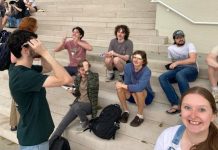
On Thursday, Sept. 22, a board of faculty will vote on whether to enact a proposal that would shorten the length and alter the format of what has become known as August Term.
Five years ago, Transylvania University started a five-year pilot program to enhance the first year experience. First Engagements, or August Term as it has been dubbed by students and faculty, is a month-long course for first year students that earns them a full course credit before entering fall term. After the five-year pilot run, the time has come for faculty to reevaluate the program, and to make adjustments as needed.
August Term was created as a part of accreditation requirements for the university. One of these requirements is a quality enhancement plan (QEP) that occurs every ten years. At the time, it was decided that enhancing the first year experience was the priority for the QEP.
Melissa Fortner served as Director of First Engagements during the last two years of the pilot period and is the lead reviewer of the program as it pertains to its reevaluation. However, the entire faculty is involved with the decision making process, and will vote on what to do with the program moving forward. The vote has been made that transforming the program will definitely occur, but the exact specifications for the new program have not been voted on yet.
After examining the first year programs at other universities, the current August Term proposal is modeled in similar fashion where it takes place over the course of a week.
“We are planning to provide a shorter, more condensed version of what we do now, that is more in line with our resources,” said Fortner.
A major change with the current proposal that involves a weeklong term is that it will no longer count as a full credit course. It will only count for .25 credits. This also makes it so the course does not count as one of the faculty member’s seven courses that they teach throughout the year. It is something extra that they will have an obligation to fulfill every few years.
“It’s not going to look like First Engagements. The proposal on the table now with the most faculty support is for a seminar the week before classes start, focused around one broad theme. It will no longer be a common experience. Faculty members may overlap their classes, but they create their own course plan under the theme,” said Fortner.
We are planning to provide a shorter, more condensed version of what we do now, that is more in line with our resources.
While the academic orientation will still be maintained and students will still be introduced to the college level of thinking, the format will change. The vote on this proposal occurs Thursday. If it is passed, then there will be a committee formed to enact the program. If it does not pass, then the faculty will go back to the drawing board. The seminar program, if passed, will be reevaluated after it runs for a few years, just as August Term was reviewed.
“Had we felt that we had the resources, we might have pushed for August Term in its old form for a little bit longer and to do it in the way that we really wanted to. That is my opinion, however faculty are pretty split on what would have been best for the students. Both plans will serve the purpose that it needs to serve,” said Fortner.
While the faculty decided at the end of the five-year trial run to reform the program, there were definitely some positives of the program that Fortner and the faculty want to uphold.
“There are a lot of things about it that went really well and it seemed pretty clear that the social transition was very successful,” said Fortner. “We thought the orientation activities were more successful before the start of the school year and allowed the first year class to develop an identity together, and we felt like there was value in the academic experience.”
While there were definite positives to the program, financially it was not very affordable for the university. Students did not have to pay for August Term and Transy was providing the meals for each student during this three week period. To offset the costs of this, Transy provided one less May Term, and if students wanted to take a fourth May Term, they would need to pay extra.
Almost universally, students and faculty disliked the cost of the fourth May Term.
“At all levels it was felt that it was a pretty big cost to pay, so in the new proposal we made the change to allow four May Terms, students just need to pay for a meal plan if they wish to use the services,” said Fortner.
While the May Term issue has been resolved, there are still a lot of details that need to be worked out as it pertains to the financial issues of August Term.
“It takes a lot of resources. It takes a lot of people, a lot of time, and a lot of money to run August term the way that we were doing it,” said Fortner. “There is a lot of preparation involved in order to provide a common experience. It is more difficult and more intense than if individual faculty members developed a class on their own. It is a completely different process, and their needs to be very systematic preparation done ahead of time. It does cost money to have the RAs come back, and it costs money to provide August Term Scholars.”
We were not sure that we were able to do a great job with the resources that we had. We were doing a good job, but we wanted to do a great job.
With such tremendous efforts being put into the program, it was deemed not financially reasonable, especially when it came to faculty members organizing their classes for the rest of the year.
“As a faculty we are pretty lean. We were finding that programs were not being able to offer classes that they needed, or that it was costing money, or that we had to hire adjuncts, or had to decide not to offer particular courses at all,” said Fortner. “A lot of the issue was resources. Can we sustain the program with the resources that we have? The fact that we are running at a deficit came into play here.”
In order to have an immensely successful program that involved all of the successful elements of the program, more resources were needed.
“We were not sure that we were able to do a great job with the resources that we had. We were doing a good job, but we wanted to do a great job, so there were aspects of the academic component that needed to be strengthened, and in order to do that we needed more time, and in order to do that we needed to pay the faculty more. To balance all that out we were not getting those resources, so we have to do something different,” said Fortner.
An update on the results of the vote will be released as soon as information is available.




